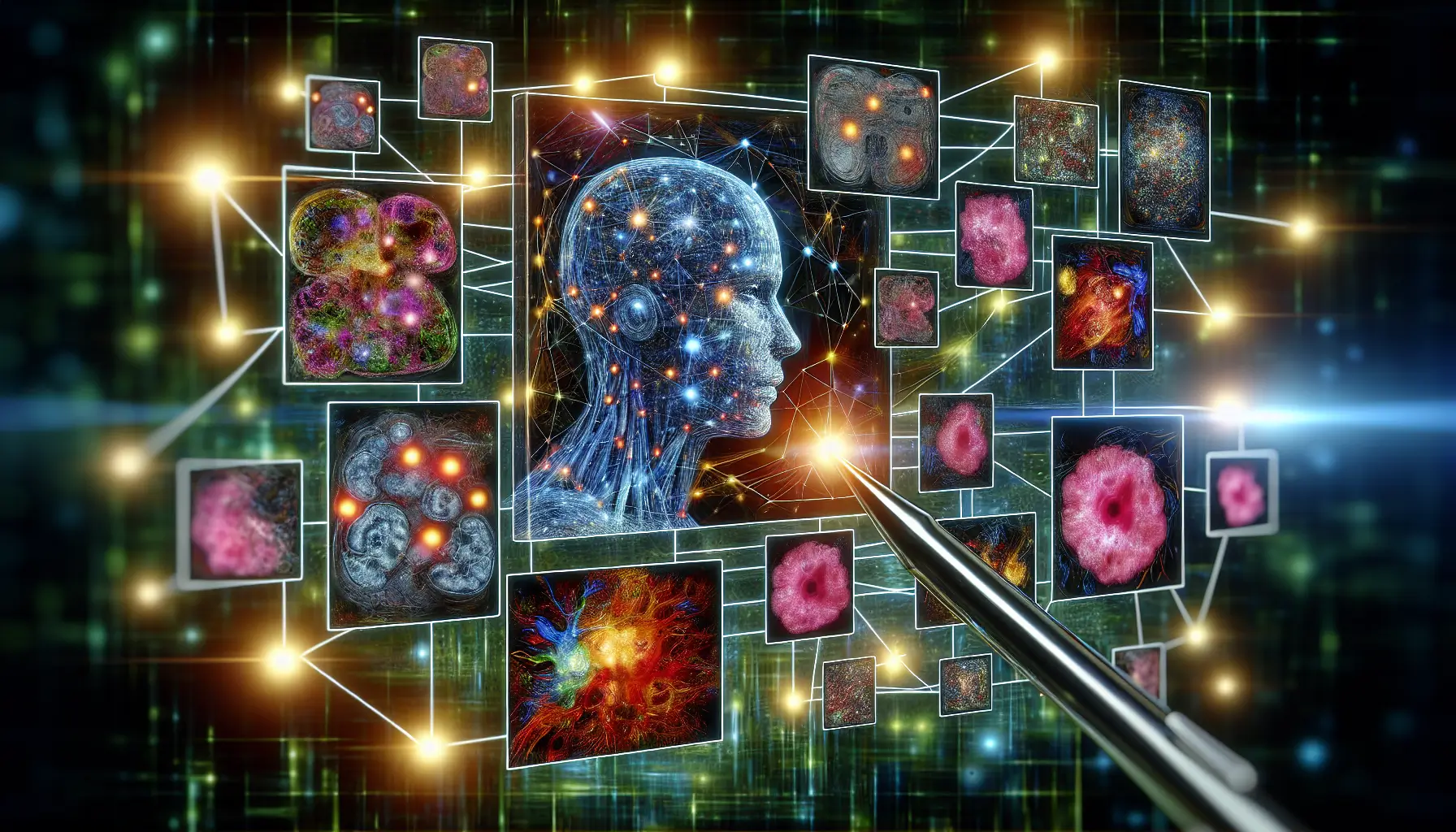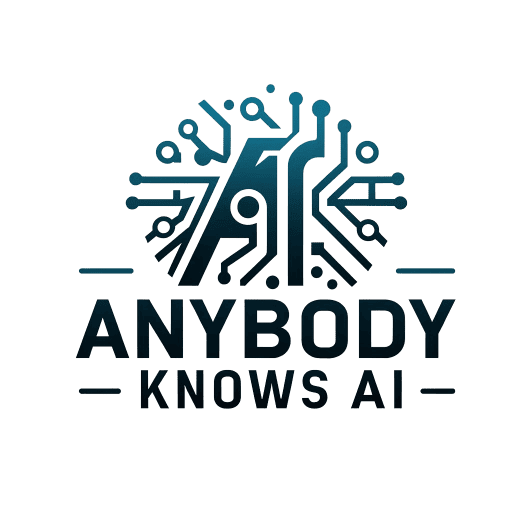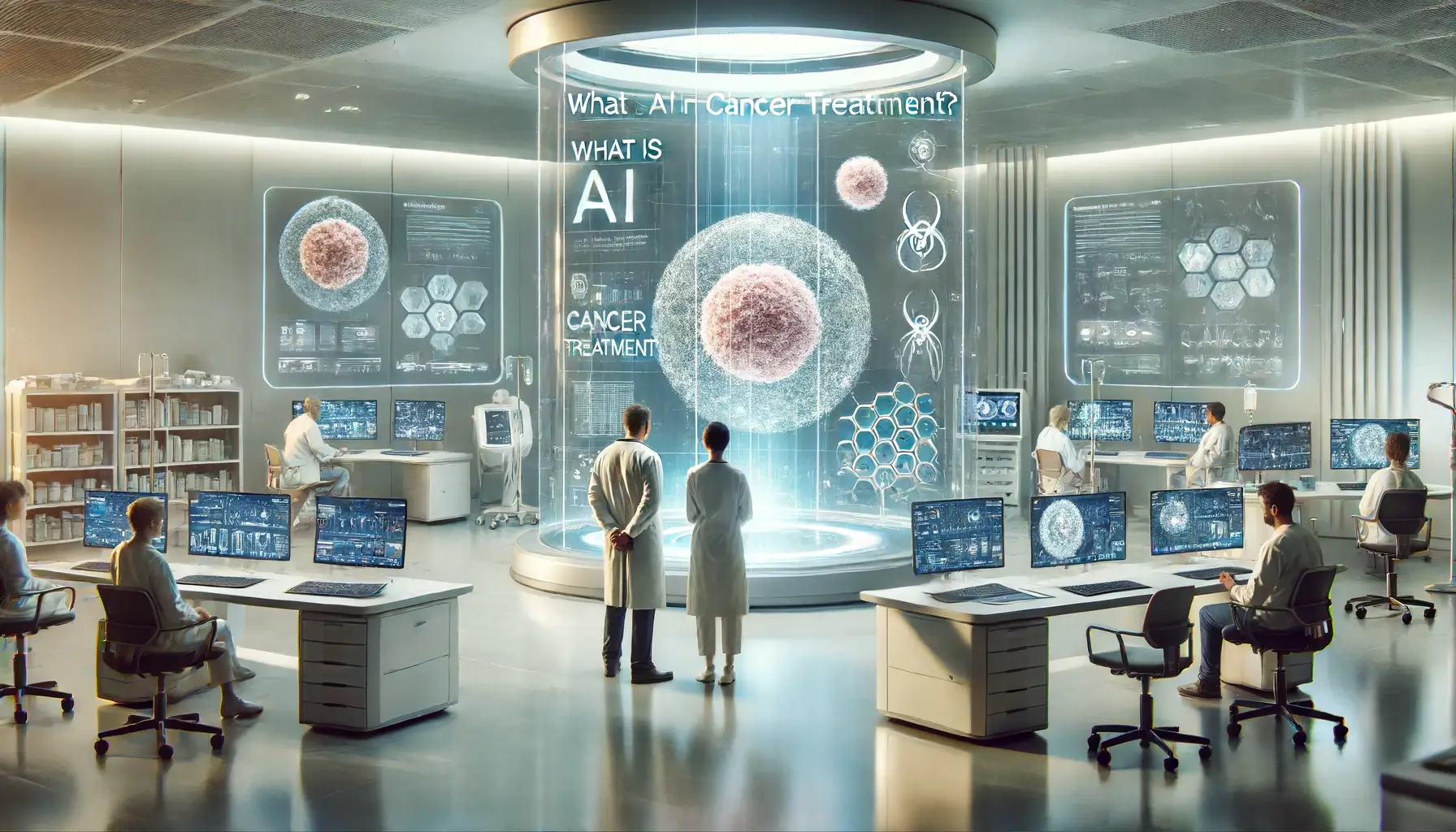What is AI in cancer treatment, and how is it changing the lives of patients? In simple terms, it’s the use of advanced algorithms to improve the precision and efficiency of cancer care. From early detection to selecting the right treatment, AI assists doctors in making data-backed decisions that save lives.
This article delves into AI’s powerful impact, consistently enhancing cancer treatment outcomes while supporting a more patient-centered approach.
Key Takeaways
- AI significantly improves cancer care by enabling early detection, facilitating personalized treatment plans through precision medicine, and enhancing treatment outcomes by uncovering data patterns invisible to humans.
- AI advances cancer diagnosis by interpreting complex medical images with higher accuracy, integrating with electronic health records (EHRs) for comprehensive patient data analysis, and employing predictive analytics for more accurate diagnosis and personalized treatment planning.
- The integration of AI in drug discovery accelerates the pace of finding new cancer treatments by identifying molecular targets, streamlining clinical trials, and improving the use of real-world data to predict drug efficacy and patient outcomes.
AI’s Role in Revolutionizing Cancer Care

The fusion of recent AI advancements, modern computer hardware, and extensive cancer data has given rise to new cancer research applications. AI systems enhance cancer care through early detection strategies and personalized treatment plans by analyzing patient data to identify individuals at risk, utilizing digital twin models for real-time tumor behavior analysis, and aiding therapy planning.
In precision medicine, AI uses many data streams, including health and medical records, to understand complex data patterns, analyze associations between treatments and outcomes, and predict positive responses to treatments like immunotherapy.
AI revolutionizes cancer care with its immense processing and analytical capacity, enabling it to uncover data patterns imperceptible to human analysis. This capability transforms cancer treatment in three fundamental ways: by encouraging early detection, facilitating precision medicine, and enhancing treatment outcomes. Each aspect contributes significantly to improving patient survival and overall quality of life.
The Power of Early Detection
Successful cancer treatment and improved patient outcomes hinge on early detection. To this end, AI enhances the detection of breast cancer on mammography and predicts the long-term risks of invasive breast cancers with high precision.
Deep learning algorithms trained on disease data have been used to predict an individual’s risk of developing pancreatic cancer, a pivotal step in early detection. Personalized medicine, through AI applications, can have doctors determine individuals who may be at risk of cancer and support early diagnosis, thus facilitating timely interventions.
AI’s role in early detection extends beyond breast and pancreatic cancer. For instance, AI tools are being developed to improve cancer screening for skin, prostate, and other cancers.
These tools analyze medical images and patient data to identify subtle signs of cancer that traditional methods might miss. By catching cancer at its earliest stages, AI boosts the chances of successful treatment and significantly enhances patient survival rates.
Precision Medicine and Personalized Plans
Artificial intelligence serves as a linchpin in furthering personalized medicine in oncology. Personalized medicine revolves around individualized care determined by genetic abnormalities and specific proteins observed in the cancer cells of different patients.
AI plays a crucial role in detecting specific deficiencies in cancer cells, such as homologous recombination defects, which are essential for predicting how patients will respond to certain drugs.
The ability of AI to move clinical workflow and ensure accurate clinical data, analysis, and treatment information allows clinicians to:
- Weigh treatment risks and benefits more accurately, aiming to avoid ineffective or harmful treatments
- Provide precision in treatment planning so cancer patients receive therapies tailored to their unique genetic profiles.
- Significantly improve treatment outcomes and reduce adverse effects.
AI’s role in precision medicine is a testament to its potential to revolutionize cancer care by making treatments more effective and personalized.
Enhancing Treatment Outcomes
AI algorithms enhance risk stratification criteria, an essential factor in assessing cancer treatment effectiveness, thereby paving the way for protocol modifications that improve patient outcomes.
By accurately predicting treatment responses and potential adverse effects, AI helps clinicians tailor treatment plans to individual patients, improving overall patient outcomes and survival rates.
Integrating AI in cancer therapy ensures that every patient receives the most appropriate and effective treatment, significantly impacting the success of cancer treatments.
Harnessing AI for Diagnostic Excellence

By detecting complex patterns in data, interpreting medical images, and employing natural-language processing for data analysis, AI is revolutionizing cancer diagnostics.
AI algorithms can detect patterns in extensive cancer data sets that may not be easily noticed by human analysis, demonstrating AI’s powerful capabilities in diagnostic excellence.
The FDA’s authorization of AI-based software for identifying cancer in medical images, such as prostate biopsy images, substantiates the reliability and precision of AI diagnostics in clinical settings.
AI-based tools enhance diagnostic accuracy by distinguishing radiographic patterns within medical imaging data, aiding in detecting and characterizing various cancers.
Natural-language processing techniques have been pivotal in digitizing free-form medical notes, converting them into structured data that can be used to train AI systems for improved cancer data analysis.
These advancements in AI improve diagnostic accuracy and speed up the diagnostic process, enabling faster and more accurate cancer detection and treatment planning.
Interpreting Complex Medical Images
Deep learning aids radiologists in medical image analysis and assessment by automating the quantification of radiographic patterns, occasionally exceeding human capabilities. In mammogram assessment, AI enhances speed and accuracy, processing scans with 99% accuracy and allowing radiologists to prioritize tasks that require their expertise.
AI-driven algorithms improve the accuracy of medical imaging, helping delineate tumor boundaries and aiding in treatment planning to benefit patients and achieve better therapeutic outcomes.
The FDA’s authorization of AI-based software to aid pathologists in detecting prostate cancer in biopsy images demonstrates the growing trust and reliance on AI in cancer diagnosis. This technology is not limited to mammograms and prostate cancer but extends to other types of cancer imaging, providing a powerful tool for radiologists and pathologists.
By integrating AI into the diagnostic process, healthcare providers can improve skin cancer first detection accuracy and speed, leading to better patient outcomes.
EHRs: A Treasure Trove for AI
Language models trained on vast electronic health records (EHRs) are employed to understand social determinants of health that are crucial across the cancer care continuum, encompassing prevention, detection, and treatment.
Tokenization and sophisticated AI analytical methods are utilized to weave diverse sources of real-world medical data together, resulting in a more comprehensive overview of a patient’s health status. Incorporating AI algorithms with EHR systems can enhance healthcare facility operations by facilitating better resource distribution, focusing on subgroups at higher cancer risk or consequences.
When AI analyzes, EHRs provide information that can reveal patterns and insights that improve cancer diagnostics and treatment planning. By integrating AI with EHRs, healthcare providers can better understand patient histories, predict treatment responses, and identify at-risk populations.
This integration improves patient outcomes and optimizes healthcare resources, ensuring that patients receive the care they need when they need it.
Predictive Analytics in Diagnosis
Studies using machine and deep learning models and techniques, such as support vector machine classifier models for breast cancer diagnosis, have demonstrated that AI predictive analytics can boost diagnostic accuracy by quantifying tumor features invisible to the human eye. In personalized cancer treatment, AI has been instrumental in:
- Detecting prognostic biomarkers
- Guiding medical professionals in choosing appropriate treatments
- Predicting disease prognosis, progression, and patient survival
- Aiding in the reduction of adverse treatment events
These advancements in AI-powered predictive analytics strategically utilize clinical assessments, patient medical histories, and various data points to provide accurate and personalized colon cancer treatment through risk prediction.
These predictive capabilities are crucial for improving cancer diagnostics and treatment outcomes. By leveraging AI, clinicians can make more informed decisions about treatment strategies, anticipate potential complications, and tailor therapies to individual patients.
This enhances the effectiveness of treatments and minimizes the risk of adverse events, leading to better overall patient care.
Optimizing Treatment with AI-Driven Insights

AI-driven insights optimize cancer treatment by predicting patient responses, facilitating proactive patient safety management, and formulating optimal treatment plans. AI analyzes PET/MRI scans to predict responses to neoadjuvant chemotherapy in advanced breast cancer and immunotherapy in advanced melanoma.
AI’s predictive capabilities extend to forecasting adverse events from treatments and treatment response and enabling proactive patient safety management. The insights provided by AI on patient responses facilitate the formulation of optimal treatment regimens, enhancing personalized patient care.
Using routine clinical data from simple blood tests, AI tools can:
- Predict how cancer patients will respond to treatments like immune checkpoint inhibitors
- Develop personalized treatment plans that maximize efficacy and minimize side effects
- Offer more precise and effective therapies, ultimately improving patient outcomes and quality of life
Treatment Planning and AI Algorithms
In treatment planning, AI models assist oncologists in developing accurate radiation therapy plans that adjust dosage and targeting based on individual patient factors.
AI technologies are instrumental in expediting the genetic subtyping of brain tumor tissues during surgery, significantly accelerating the time to treatment decision-making.
Artificial intelligence improves the management of chemotherapy drugs by predicting patient tolerance, leading to the optimization of chemotherapy regimens.
CURATE.AI, an AI platform that employs deep and machine learning algorithms, enhances the efficacy and tolerance of combined treatments through optimal dosing determination.
AI methods combine multiple patient data streams, culminating in powerful diagnostic systems that aid in treatment planning and prognostication while factoring in:
- imaging
- genomics
- pathology
- electronic health records
This comprehensive approach ensures that each patient receives the most effective and personalized treatment possible while monitoring their treatment response.
Predicting Patient Response
AI has been leveraged to:
- Predict immune cell responses to tumors, improving the selection and effectiveness of immunotherapy treatments
- Utilize genetic and imaging data to determine the best candidates for immunotherapy and anticipate patient responses to these treatments.
- Analyze clinical and genomic features to estimate outcomes with immune checkpoint blockade therapy.
One AI model called LORIS can estimate outcomes with immune checkpoint blockade therapy by analyzing clinical and genomic features.
A study led by Anant Madabhushi demonstrated that an AI platform successfully doubled the rate of predicting lung cancer patients’ responses to immunotherapy. AI models can predict patients’ responses to various chemotherapy regimens, vital for crafting personalized and effective treatment strategies.
These predictive capabilities ensure that each patient receives the most appropriate therapy, maximizing treatment efficacy and improving patient outcomes.
Minimizing Adverse Events
By enabling healthcare providers to predict adverse reactions to cancer treatments proactively, AI directly enhances patient safety. By predicting which patients are likely to visit the emergency room.
AI assists care teams in taking proactive steps that not only keep patients stable but also result in significant cost savings. AI-enabled technologies support real-time monitoring of cancer treatments, leading to instant adjustments to therapy protocols based on patient responses and minimizing potential adverse events.
Deep learning techniques help predict the survival and pathological response of lung cancer patients undergoing radiation therapy, underscoring the influence of AI in real-time monitoring.
AI systems can rapidly comprehend how cancer cells develop resistance to drugs, which is essential for improving drug development and treatment courses.
By employing AI methods, healthcare providers can better manage patient care, reduce adverse events, and improve overall treatment outcomes.
Accelerating Drug Discovery Through AI

Artificial intelligence expedites drug discovery by facilitating a more rapid and cost-effective analysis of large data sets and genetic information. In the pre-clinical stage, artificial intelligence AI is used to identify new molecular targets and predict drug toxicity, aiding in early decision-making for drug development.
AI technologies optimize anticancer drug research by simulating the human brain and thought process, enhancing logical reasoning and machine learning, and ultimately expediting drug discovery cycles.
The power of AI in drug discovery lies in its ability to:
- sift through vast amounts of data to identify potential drug candidates quickly
- speed up the drug discovery process
- reduce costs
- increase the likelihood of finding effective treatments
This capability is transforming the pharmaceutical industry, making it possible to develop new cancer drugs at an unprecedented pace.
Identifying New Cancer Drugs
UC San Diego scientists have developed the POLYGON machine learning algorithm, which accelerates chemistry simulations in the early stages of drug discovery, potentially paving the way for new cancer treatments.
The open-source nature of the POLYGON AI tool facilitates wider access and collaboration among researchers, differentiating it from proprietary AI methods in the pharmaceutical industry.
POLYGON can identify molecules that target multiple proteins, paving the way for developing multi-target drugs that may have fewer side effects than combination therapies.
Using POLYGON, researchers synthesized 32 new drug candidates targeting cancer-related proteins MEK1 and mTOR, revealing drugs with high activity and low off-target reactions. AI is instrumental in unraveling the complex atomic behaviors of proteins like RAS, often mutated in cancers, thereby revealing new treatment targets.
This approach not only accelerates drug discovery but also holds the promise of developing more effective and safer cancer treatments.
Streamlining Clinical Trials
Applying advanced analytics and AI-driven models can minimize uncertainties in clinical trial design, potentially resulting in smaller required sample sizes and shorter trial durations. AI-based tools are being developed to automate eligibility screening, and AI aids in matching potential participants with clinical trials using complex eligibility criteria, improving recruitment efficiency.
These advancements streamline the clinical trial process, making it faster and more efficient.
AI’s ability to reduce the sample size in clinical trials by improving the selection process for study participants is a game-changer. This accelerates the trial process and ensures a more diverse and representative participant pool. By integrating AI into clinical trials, researchers can:
- Gather more accurate and comprehensive data
- Identify patterns and trends that may not be apparent to human researchers
- Predict patient outcomes and treatment responses
- Personalize treatment plans based on individual patient characteristics
- Ultimately develop more effective and widely applicable cancer treatments.
Real-World Data and AI
The refinement of AI predictive models, including machine learning models, with real-world patient data has significantly increased their accuracy in clinical settings. AI models trained with diverse datasets, including real-world patient data, have shown improved predictive power in gauging the efficacy of cancer drugs.
This integration ensures that AI predictions are grounded in practical, real-world scenarios, enhancing their reliability and applicability.
Continuous integration of up-to-date real-world data is essential for the growth and refinement of AI models, ensuring their applicability and effectiveness in evolving cancer treatments. Real-world data inputs are crucial for AI algorithms to make more reliable patient survival predictions.
By leveraging real-world data, AI models can provide more accurate and actionable insights, leading to better patient outcomes and more effective cancer treatmen
ts.
The Future of AI in Oncology
The evolution and integration of advanced AI models, datasets, and applications hold significant promise for enhancing patient diagnosis, treatment, and care in oncology. The future of AI in oncology involves a collaborative effort between human expertise and AI technologies, ensuring that the benefits of AI are fully realized in clinical practice.
As we look ahead, we will focus on leveraging a deep learning approach, human-AI synergy, addressing ethical considerations, and driving innovative AI applications in cancer care. These elements will play a crucial role in shaping the future of oncology, ensuring that AI continues to enhance cancer treatment and improve patient outcomes.
Human Input and AI Synergy
A critical collaboration between human intellect and artificial intelligence enables the widespread use of artificial intelligence AI and AI-supported tools by clinicians and researchers, thereby enhancing cancer care and clinical outcomes. This synergy ensures that AI technologies are used to their fullest potential, complementing human expertise with advanced data analysis and predictive capabilities.
By integrating human input with AI technologies, healthcare providers can:
- Make more informed decisions
- Improve the accuracy and effectiveness of cancer treatments
- Enhance patient care
- Drive innovation in cancer research
- Develop new and more effective treatment strategies
This collaborative approach has the potential to revolutionize cancer care.
Ethical Considerations in AI Use
The Executive Order on the Safe, Secure, and Trustworthy Development and Use of Artificial Intelligence represents a government-wide initiative to guide the responsible development of AI across various sectors, including healthcare.
The National Institutes of Health focuses on the ethical application of AI in healthcare through research activities described in Artificial Intelligence at the NIH. Recognizing the sensitivity in cancer care, established guidelines and regulations are imperative for protecting patient privacy and autonomy while utilizing AI in oncology.
In the evolution of precision oncology, upholding ethical standards must go hand in hand with the technological progress of AI-based approaches. Data privacy and the secure accessibility of patient data are critical concerns, as they significantly impact the ability of AI models to be trained effectively for cancer treatment.
Ensuring the ethical use of AI in oncology is essential for maintaining patient trust and maximizing the benefits of AI technologies.
Looking Ahead: AI Technologies and Innovations
The National Artificial Intelligence Research and Development Strategic Plan 2023 Update, supported by the National Cancer Institute, outlines key research challenges expected to guide the development of innovative AI applications in cancer care.
This strategic plan highlights the importance of continued investment in AI research and development, ensuring that new technologies can be effectively integrated into clinical practice.
The emphasis will be on evolving AI technologies to make research data further augment cancer diagnosis, treatment, and patient care. These innovations will drive the next wave of advancements in oncology, offering new hope for cancer patients and improving overall patient outcomes.
Summary
Throughout this journey, we’ve explored how AI revolutionizes cancer care, from early detection and precision medicine to diagnostic excellence and treatment optimization. AI’s ability to analyze vast amounts of data and uncover hidden patterns transforms how we approach cancer treatment, leading to more personalized and effective therapies.
Integrating AI in cancer diagnostics and treatment planning improves patient outcomes and the overall quality of the healthcare and healthcare team.
As we look to the future, the synergy between human expertise and AI technologies will continue to drive innovation in oncology. By addressing ethical considerations and investing in cutting-edge AI research, we can ensure that AI remains a transformative force in the fight against cancer.
The future of cancer care is bright, and with the continued advancement of AI, we can look forward to breakthroughs and improved patient outcomes.
Frequently Asked Questions
How does AI improve early cancer detection?
AI improves early cancer detection by using advanced analysis of medical images and patient data, identifying subtle signs of cancer that may be overlooked by traditional methods, ultimately leading to earlier diagnosis and more effective treatment.
What role does AI play in personalized cancer treatment?
AI is crucial in personalized cancer treatment, as it analyzes genetic abnormalities and specific proteins in cancer cells to create tailored treatment plans for each patient. This ensures the most appropriate and effective therapy for individuals.
How does AI optimize cancer treatment planning?
AI optimizes cancer treatment planning by assisting oncologists in devising precise radiation therapy plans and optimizing chemotherapy regimens based on patient-specific factors, leading to improved treatment efficacy and patient outcomes.
What ethical considerations are important in the use of AI in oncology?
Ethical considerations in using AI in oncology include protecting patient privacy, ensuring data security, and upholding ethical standards in technology development and use. These considerations are crucial for maintaining trust and ensuring the well-being of patients.
How is AI accelerating drug discovery for cancer treatment?
AI is speeding up drug discovery for cancer treatment by swiftly analyzing vast data sets, which helps identify potential drug candidates, reduce costs, and improve patients’ chances of finding effective therapies.







